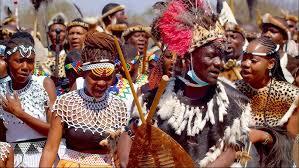News / National
Ndebeles commemorate Mzilikazi Day
07 Sep 2024 at 14:53hrs |
6 Views

Ndebele people in Bulawayo, as well as those across Zimbabwe and abroad, are commemorating the 156th anniversary of the death of King Mzilikazi Khumalo, the founder of the Ndebele nation. The commemorations, which honor Ndebele history, culture, and identity, began this morning with a procession from the Matshobane high-density suburb to Bulawayo City Hall.
Bulawayo Mayor David Coltart addressed the gathering, emphasizing the importance of the commemoration and advocating for it to become an annual event on the city's calendar. Further celebrations and activities are planned at Mhlahlandlela, one of Mzilikazi's four ancient capitals located along Old Gwanda Road, 22 kilometers south of Bulawayo. This site is historically significant, named after Zulu King Shaka's old capital, despite attempts by some historians to challenge this fact, as well as to distort the details of Mzilikazi's lineage.
King Mzilikazi and his son, King Lobengula, have left a lasting legacy in Zimbabwe's history, especially in Bulawayo. Their influence is evident in the numerous suburbs, schools, roads, and public facilities named after them, their family, and key figures of the Ndebele nation. Examples include suburbs like Matshobane, Khumalo, Lobengula, Famona, Njube, Nguboyenja, Nkulumane, Magwegwe, and Gwabalanda, as well as schools such as Mzilikazi, Lobengula, and Lozikeyi.
Mzilikazi is widely regarded as a legendary figure and nation-builder, respected even by his opponents. In 1821, he broke away from King Shaka's Zulu kingdom and led a migration to present-day Zimbabwe, where he established the Ndebele nation in the southwest. A former top military commander under Shaka, Mzilikazi left Zululand alongside other Nguni military leaders like Soshangane, who settled in Mozambique and eastern Zimbabwe, and Zwangendaba, who moved to Zambia, Malawi, and Tanzania. This period, known as the Mfecane wars, led to migrations that left lasting marks on regions such as Eswatini, Lesotho, Botswana, Zambia, Malawi, Tanzania, and Zimbabwe.
Mzilikazi was born in 1790 near Mkhuze in present-day Zululand, South Africa, and passed away on September 5, 1868, after a prolonged illness. His death was kept secret by his chief councilors and some of his queens at Emanxiweni. His body was quietly transported to Mhlahlandlela near Matopo Hills, and his death was officially announced to the Ndebele nation on September 9, 1868.
Following his death, there was no clear heir, leading to the appointment of Regent Mncumbatha Khumalo. Some factions, including the Zwangendaba Regiment led by Mbiko KaMadlenya Masuku, hoped that Nkulumane, Mzilikazi's son, was still alive in South Africa and opposed the rise of King Lobengula. This led to a bloody conflict, which ultimately saw Lobengula triumph. He ruled until the British South Africa Company forces invaded Bulawayo in 1893. Lobengula disappeared after the famous Shangani Patrol and Major Wilson's Last Stand in December 1893, during the Anglo-Ndebele War—a battle recently commemorated by the government of President Emmerson Mnangagwa.
The Ndebele people, a blend of Ngunis - mainly descended from Zulus - and other tribes, are part of Zimbabwe's 15 ethnic groups, which also include the Shona, Chewa, Barwe, Kalanga, Khoisan, Nambya, Ndau, Shangani, Sotho, Tonga, Tswana, Venda, and Xhosa.
Bulawayo Mayor David Coltart addressed the gathering, emphasizing the importance of the commemoration and advocating for it to become an annual event on the city's calendar. Further celebrations and activities are planned at Mhlahlandlela, one of Mzilikazi's four ancient capitals located along Old Gwanda Road, 22 kilometers south of Bulawayo. This site is historically significant, named after Zulu King Shaka's old capital, despite attempts by some historians to challenge this fact, as well as to distort the details of Mzilikazi's lineage.
King Mzilikazi and his son, King Lobengula, have left a lasting legacy in Zimbabwe's history, especially in Bulawayo. Their influence is evident in the numerous suburbs, schools, roads, and public facilities named after them, their family, and key figures of the Ndebele nation. Examples include suburbs like Matshobane, Khumalo, Lobengula, Famona, Njube, Nguboyenja, Nkulumane, Magwegwe, and Gwabalanda, as well as schools such as Mzilikazi, Lobengula, and Lozikeyi.
Mzilikazi is widely regarded as a legendary figure and nation-builder, respected even by his opponents. In 1821, he broke away from King Shaka's Zulu kingdom and led a migration to present-day Zimbabwe, where he established the Ndebele nation in the southwest. A former top military commander under Shaka, Mzilikazi left Zululand alongside other Nguni military leaders like Soshangane, who settled in Mozambique and eastern Zimbabwe, and Zwangendaba, who moved to Zambia, Malawi, and Tanzania. This period, known as the Mfecane wars, led to migrations that left lasting marks on regions such as Eswatini, Lesotho, Botswana, Zambia, Malawi, Tanzania, and Zimbabwe.
Mzilikazi was born in 1790 near Mkhuze in present-day Zululand, South Africa, and passed away on September 5, 1868, after a prolonged illness. His death was kept secret by his chief councilors and some of his queens at Emanxiweni. His body was quietly transported to Mhlahlandlela near Matopo Hills, and his death was officially announced to the Ndebele nation on September 9, 1868.
Following his death, there was no clear heir, leading to the appointment of Regent Mncumbatha Khumalo. Some factions, including the Zwangendaba Regiment led by Mbiko KaMadlenya Masuku, hoped that Nkulumane, Mzilikazi's son, was still alive in South Africa and opposed the rise of King Lobengula. This led to a bloody conflict, which ultimately saw Lobengula triumph. He ruled until the British South Africa Company forces invaded Bulawayo in 1893. Lobengula disappeared after the famous Shangani Patrol and Major Wilson's Last Stand in December 1893, during the Anglo-Ndebele War—a battle recently commemorated by the government of President Emmerson Mnangagwa.
The Ndebele people, a blend of Ngunis - mainly descended from Zulus - and other tribes, are part of Zimbabwe's 15 ethnic groups, which also include the Shona, Chewa, Barwe, Kalanga, Khoisan, Nambya, Ndau, Shangani, Sotho, Tonga, Tswana, Venda, and Xhosa.
Source - online
Join the discussion
Loading comments…




































